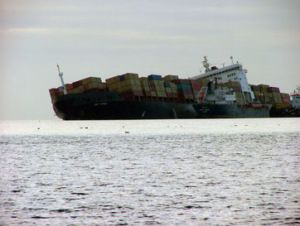News
Danish university project makes for safer seas
This article is more than 5 years old.
Longer ships mean bigger risks, but a new model from DTU might soon change that

The MSC Napoli was one of those ships damaged by whipping – something that DTU do not want to see repeated (photo: Dave Cobley)
‘Whipping’ is the occurrence of a rapid flexing of a ship’s hull girder as a result of wave impacts – its occurrence can damage or weaken the ship’s structure, with the potential for tragic consequences.
With ships being built longer and longer, the potential for whipping also increases. In 2007 and 2013, two ships measuring 300 metres in length broke in two during heavy storms. It is events of this kind that scientists at DTU hope to prevent.
Speed and simplicity
In the last ten years, DTU has developed a unique analysis framework capable of simulating the vibrations that occur on a ship when affected by waves. Now, a new model is being developed that will improve both the speed and accuracy of these calculations.
“We will develop a new predictor that can be used to narrow the critical points in the ship’s design in relation to whipping. Calculations of these scenarios can then be performed using the large analysis framework in a few minutes instead of hours,” explained Yanlin Shao, the DTU mechanic responsible for the new project, to dtu.dk.
It is hoped that the new model will improve the safety of ships constructed in Denmark and across the world.










































